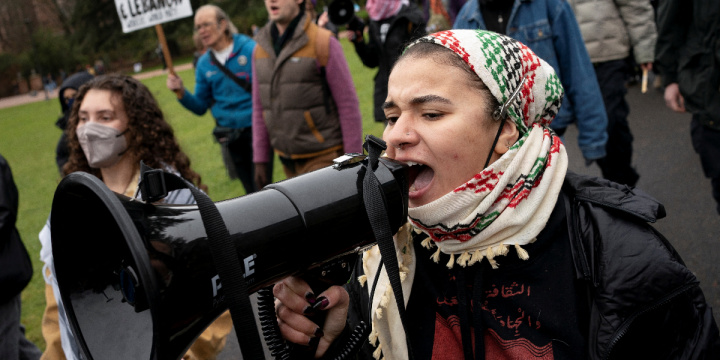Pro-Hamas demonstrators at the University of Washington in Seattle, Washington, US, on Feb. 5, 2025. Photo: David Ryder via Reuters Connect
A coalition of leading Jewish civil rights groups is calling on the higher education establishment to prioritize fighting campus antisemitism during the upcoming academic year, citing an unrelenting wave of anti-Jewish hate that has swept the US in recent years.
The Anti-Defamation League (ADL), Jewish Federations of North America, Hillel International, and the Conference of Presidents of Major American Jewish Organizations issued their joint statement on Monday, putting forth a policy framework that they say will quell antisemitism if applied sincerely and consistently. It included “enhanced communication and policy enforcement,” “dedicated administration oversight,” and “faculty accountability” — an issue of rising importance given the number of faculty accused of inciting discrimination.
“These recommendations aren’t just suggestions; they’re essential steps universities need to take to ensure Jewish students can learn without fear,” ADL chief executive officer Jonathan Greenblatt said in a statement. “Jewish students are being forced to hide who they are, and that’s unacceptable — we need more administrators to step up.”
As previously reported by The Algemeiner, colleges campus across the US erupted with effusions of antisemitic activity following the Hamas-led Oct. 7, 2023, massacre across southern Israel, an uprising which included calling for the destruction of Israel, cheering Hamas’s sexual assaulting of women as an instrument of war, and dozens of incidents of assault and harassment targeting Jewish students, faculty, and activists.
At the University of California, Los Angeles (UCLA), anti-Zionist protesters chanted “Itbah El Yahud” at Bruin Plaza, which means “slaughter the Jews” in Arabic. At Columbia University, Jews were gang-assaulted, a student proclaimed that Zionist Jews deserve to be murdered and are lucky he is not doing so himself, and administrative officials, outraged at the notion that Jews organized to resist anti-Zionism, participated in a group chat in which each member took turns sharing antisemitic tropes that described Jews as privileged and grafting. At Harvard University, an October 2023 anti-Israel demonstration degenerated into chaos when Ibrahim Bharmal, former editor of the prestigious Harvard Law Review, and Elom Tettey-Tamaklo encircled a Jewish student with a mob that screamed “Shame! Shame! Shame!” at him while he desperately attempted to free himself from the mass of bodies.
More recently, Eden Deckerhoff — a female student at Florida State University — allegedly assaulted a Jewish male classmate at the Leach Student Recreation Center after noticing his wearing apparel issued by the Israel Defense Forces (IDF).
“F—k Israel, Free Palestine. Put it [the video] on Barstool FSU. I really don’t give a f—k,” the woman said before shoving the man, according to video taken by the victim. “You’re an ignorant son of a b—h.” Deckerhoff has since been charged with misdemeanor battery.
Majorities of Jewish students continue to describe their campuses as hostile environments.
According to a recent Spring Campus Poll conducted by The Daily Northwestern, the official campus newspaper of Northwestern University, 58 percent of Jewish students reported being subjected to antisemitism or knowing someone who has. An even higher 63.1 percent said antisemitism remains a “somewhat or very serious problem.” Meanwhile, a Columbia University “climate survey” conducted last academic year found that 53 percent of Jewish students have been subjected to discrimination because of being Jewish, while another 53 percent reported that their friendships are “strained” because of how overwhelmingly anti-Zionist the student culture is. Meanwhile, 29 percent of Jewish students said they have “lost close friends,” and 59 percent, nearly two-thirds, of Jewish students sensed that they would be better off by electing to “conform their political beliefs” to those of their classmates.
Nearly 62 percent of Jewish students reported a low “feeling of acceptance” at Columbia on the basis of their religious identity, and 50 percent said that the pro-Hamas encampments which capped off the 2023-2024 academic year had a negative “impact” on their daily routines. Also, Jewish students at Columbia are more likely than their peers to report these negative feelings and experiences, followed by Muslim students.
“Campus antisemitism demands continued commitment from universities and colleges,” William Daroff chief executive of the Conference of Presidents of Major Jewish Organizations, said in a statement on Monday. “Schools that implement these recommendations will not only better serve their Jewish students but strengthen the entire campus community’s dedication to academic excellence.”
Follow Dion J. Pierre @DionJPierre.
Click this link for the original source of this article.
Author: Dion J. Pierre
This content is courtesy of, and owned and copyrighted by, https://www.algemeiner.com and its author. This content is made available by use of the public RSS feed offered by the host site and is used for educational purposes only. If you are the author or represent the host site and would like this content removed now and in the future, please contact USSANews.com using the email address in the Contact page found in the website menu.








